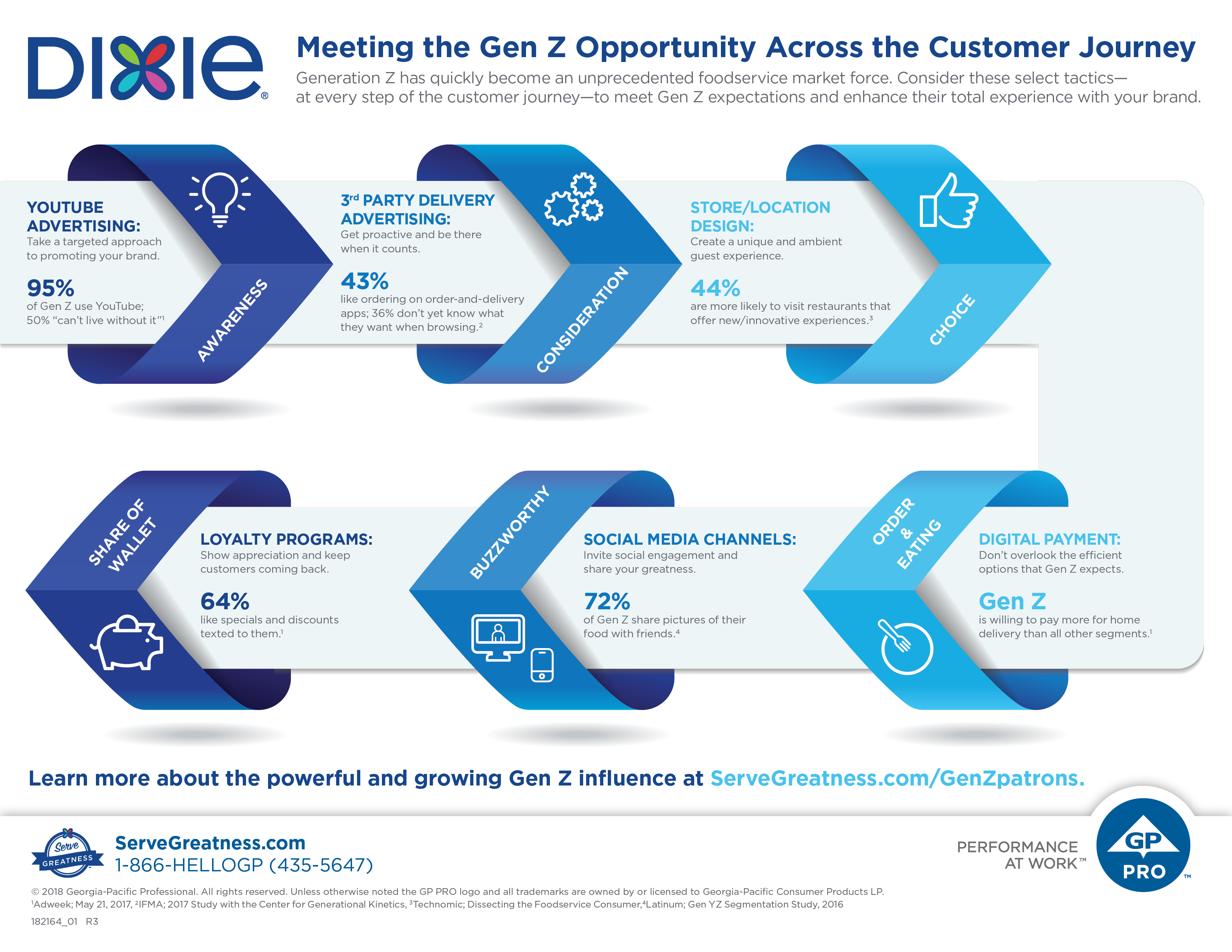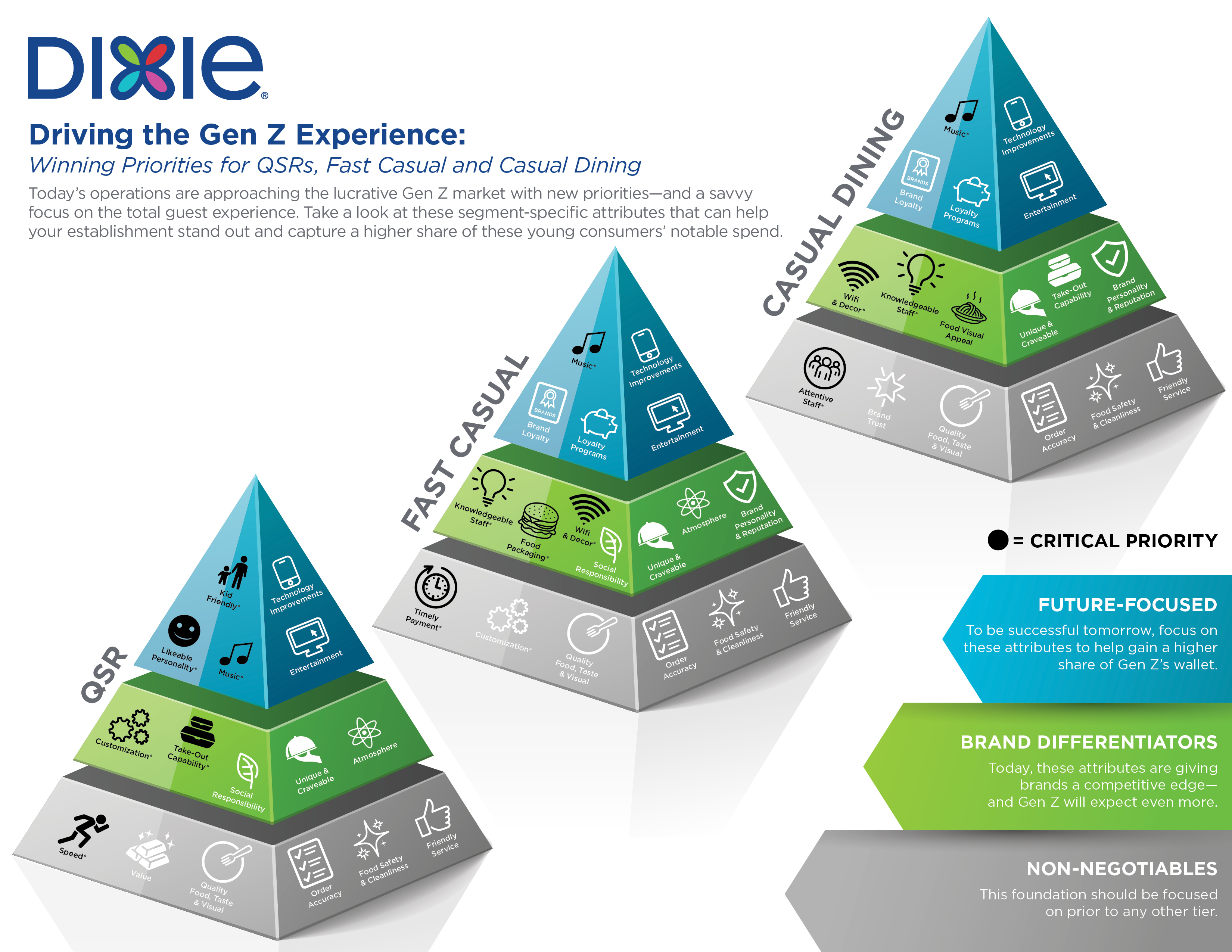Generation Z (those born from the mid-90s to the early 2000s), which currently makes up 26 percent of the U.S. population, spends $1 out of every $5 eating out—a statistic that makes clear the critical role Gen Z plays in driving restaurant growth and relevance, according to data gathered by GP PRO, a provider of foodservice disposable products and advanced dispensing solutions for commercial facilities.
GP PRO shared this Gen Z statistic and related trends at the recently held National Restaurant Association Show 2018 and the 2018 Restaurant Revenue Growth Conference. There, the company held a number of panel discussions and question and answer sessions that included several Gen Zers as well as executives from Red Robin, McAlister’s Deli, and Google, the latter of whom provided insight into their respective Gen Z-focused business practices.

“There is absolutely no question that understanding Gen Z and making business decisions to attract Gen Z customers and gain their loyalty is critical to succeeding in today’s highly competitive foodservice landscape,” said Alec Frisch, vice president and general manager of Foodservice with GP PRO. “Our respected panelists are leading the way in embracing Gen Z and shared some invaluable perspective into their own efforts.”
Among the discussion highlights were three overarching themes about the Gen Z mindset that impact both the Gen Z experience and spend, including technology, authenticity and social responsibility.
Technology
Gen Z is comprised of tech natives who have always had exposure and access to technology, particularly hand-held technology such as smartphones and tablets. This access has created a sense of immediacy among Gen Z as well as a reliance on social engagement that impacts their on- and off-premise experience with restaurant brands.
Michael Buchmeier, vice president of Operations at Red Robin, which is investing 10 percent of its resources to serving Gen Z, shared that the chain now has tablets at every table. “Red Robin has deployed table top devices to enhance the guest’s service experience. The servers use the device as an assistant, ordering kids meals and appetizers right from the table. The guests love the ability to control the timing of their experience including the ability to pay at the table when they wish. The device, called ‘the Robin,’ puts the guest in the drivers seat,” he said.
Gen Zer Joseline Sifuentes agreed that tablets are great for creating a hassle-free dining experience but noted they shouldn’t replace a guest’s interaction with a server. “I like the convenience of the tablets, but I also want to know that someone cares whether I’m having a good experience or not. There are enough restaurants providing good service that I won’t go to ones that don’t.”

Jessica Bahena, also a Gen Zer, stated that she uses technology to determine where to eat. “If I receive a coupon in a text message, I’ll often decide to visit that restaurant to take advantage of it,” she said. “I also tend to try restaurants my friends post about on social media and will share my own experiences on social media by posting pictures of my food.”
Bahena’s thoughts align with statistics shared by GP PRO, including that 64 percent of Gen Z like having specials, deals, and discounts texted to them, and 72 percent share pictures of their food with friends, many using such social channels as Snapchat, Instagram, and VSCO.
Authenticity
While image matters to Gen Z, perfection does not. Rather, Gen Z is focused on realism, transparency, and authenticity and is more likely to purchase from brands that understand this. As it relates to foodservice, although statistics shared by GP PRO indicate that 44 percent of Gen Z is more likely to visit restaurants that offer new or innovative experiences, that experience must be authentic.
“I like the transparency of an open kitchen restaurant,” said Sifuentes. “I want to be able to see where my food is being made, how it’s being made, and who is making it. I don’t want my food to come out from behind a wall and a closed door.”
Carin Stutz, COO of Red Robin, noted that she believes the menu is part of the guest experience, and in the interest of authenticity, Red Robin has one of their chefs at photo shoots to insure no fillers, gloss, or props are used. “We know that our guests take pictures of the food that’s brought to the table and those pictures will be compared to what was on the menu. Our goal is to have no discrepancy between what they see and what they receive.”
Michiel Bakker, director of Global Foodservice Programs at Google, asserted that authenticity extends beyond the restaurant experience to the ingredients people are consuming. “Our search data shows that Gen Z is using food for peak personal performance and behavior,” he said, which makes ingredient lists and nutrition data important to Gen Z decisions around food. “I think the foodservice industry needs to take a long, hard look at what the beauty industry has done. There’s a changing tide around what you put on and in your body.”
Social Responsibility
To Gen Z, brands mustexercise social responsibility—from providing a good value at a fair price to protecting the environment to advancing racial, gender, and income equality. Gen Z promotes, supports and engages with brands that embrace social responsibility.
Brandy Blackwell, director of Off-Premise Marketing at McAlister’s Deli, said the chain is well aware of Gen Z’s commitment to the environment and shared that McAlister’s is testing a new line of sustainable packaging made with compostable materials. “Brands must be willing to make an investment in environmentally friendly packaging, and they can’t focus on the cost. They need to look at what the change can do for the brand long-term.”
“I’m very aware of the long-term environmental effects of plastic straws and plastic bags, and I don’t want to use them,” said Sifuentes. “I don’t want to do anything that’s going to hurt animals or people or the environment.”
Supporting the idea that social responsibility includes more than protecting the environment, Bahena added that she frequents restaurants that give her a good value. “It’s not about wanting a cheap meal. It’s about getting what I pay for and having my expectations met,” she said. “Brands have a responsibility to deliver what they promise.”
Gen Z is Driving Restaurant Growth and Relevance posted first on happyhourspecialsyum.blogspot.com

No comments:
Post a Comment